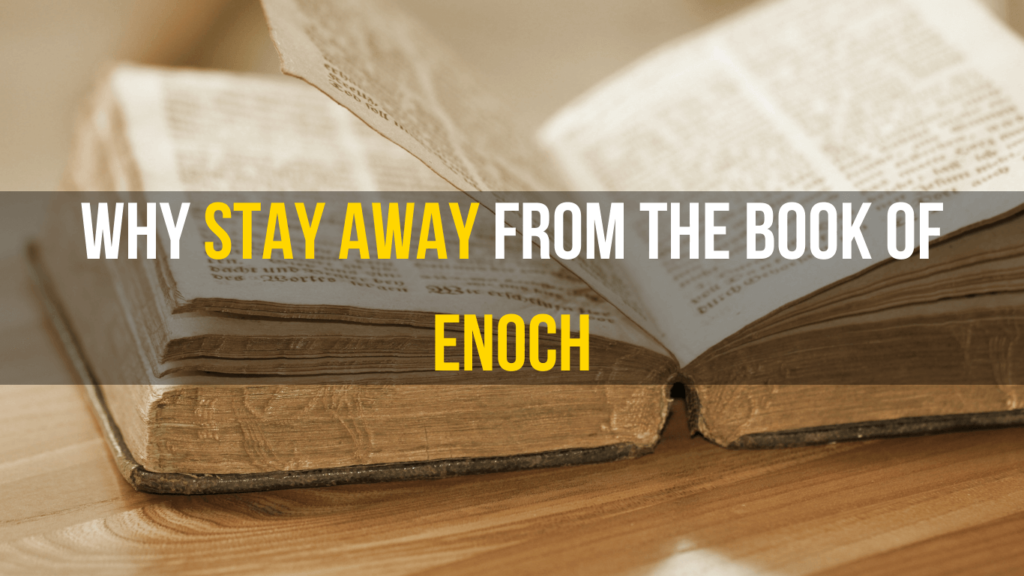The Book of Enoch is a captivating and mysterious piece of literature that has fascinated many due to its writings about angels, the heavenly hierarchy, and the enigmatic Watchers.
However, for Christians, it is essential to approach this text with caution. While the book offers claims about divine prophecies, hidden knowledge, and mystical insights, it is not included in the canonical Bible. Serious concerns about its authenticity, reliability, and alignment with God’s Word have led to its exclusion from the sacred scriptures.
Let us explore why the Book of Enoch is not part of the Bible, uncover its historical context, and examine its content to understand why it poses a risk of deviation from truth.
The Shrouded Origins and Historical Context
The origins of the Book of Enoch are shrouded in mystery. Scholars believe it is a compilation of texts written by multiple authors over centuries, rather than the work of a single author. The oldest sections of the book likely date to around 300 B.C., while the youngest parts were written as late as 100 A.D..
This situates the book within the period of Second-Temple Judaism (516 B.C. to A.D. 70), a turbulent time in Israelite history, marked by the rebuilding of the temple under Cyrus and later struggles under Roman rule.
During this era, Jewish theology and cosmology began incorporating apocalyptic ideas, esoteric claims, and mystical writings to address the suffering and hope of the community. However, the authorship of the Book of Enoch remains uncertain. It is falsely attributed to Enoch, a figure briefly mentioned in Genesis as someone who “walked with God” and was taken to heaven without experiencing death.
This attribution raises questions about its credibility, as there is no evidence that Enoch wrote these texts. Instead, the book appears to reflect the ideas of various thinkers influenced by the cultural and religious concerns of their time.
Why Isn’t the Book of Enoch in the Bible?

The Book of Enoch was not included in the Bible because it does not possess the authority or divine inspiration required of scripture. For Christians, the Bible is the ultimate source of truth and the exhaustive guide for faith and practice.
The writings of Abraham, Moses, and the apostles form the foundation of the covenant between God and His people, and the teachings of Mary, Christ, and the apostles solidify this faith. While early church fathers, such as Origen, Tertullian, and Clement, recognized the Book of Enoch, they found it inconsistent with the teaching of the Bible.
Unlike canonical texts that are clearly inspired by God, the Book of Enoch introduces writings about angels, cosmology, and esoteric knowledge that are not aligned with God’s truth. The councils of the early church deliberately excluded it to preserve the integrity of the scripture, which remains unchanging and divinely inspired.
The Didache, Shepherd of Hermas, and other early Christian texts were also excluded for similar reasons. The decision to leave the Book of Enoch out of the Bible reflects its lack of alignment with the truth preserved by Christians through the centuries.
The Book of Enoch Contains False Teachings
The teachings within the Book of Enoch often contradict the Bible, particularly in its portrayal of angels and their hierarchy. The book introduces the Watchers, a group of celestial beings who descended to Earth and engaged in forbidden relationships with humans, resulting in the birth of giants.
These narratives assign roles to angels that are not supported by the Bible and delve into astrology, occult practices, and cosmic phenomena that align more with esoteric thought than with biblical truth.
The Book of Enoch also claims to reveal hidden knowledge, presenting a mystical view of the universe that diverges from the clear teachings of the Bible.
These claims risk undermining the trust Christians place in God as the source of all truth. Instead of focusing on scripture, the book promotes celestial and speculative ideas that distract from the core message of salvation.
Who Are the Watchers in the Bible?

The Watchers, as described in the Book of Enoch, are angelic beings mentioned briefly in Genesis but expanded into detailed narratives in the book.
According to this account, the Watchers descended from heaven to Earth, took women as wives, and fathered the giants or Nephilim. This act of defilement resulted in widespread chaos, anarchy, and moral decay.
The Watchers also introduced humans to forbidden knowledge, teaching them charms, enchantments, and the art of metalworking, which led to the creation of weapons and the spread of war.
Their influence corrupted the Earth, filling it with fornication, corruption, and lawlessness. The cry of the righteous reached heaven, prompting divine intervention through the Flood during the time of Noah.
While the Bible briefly references the Nephilim, the Book of Enoch creates an elaborate lore that borders on mythology. The focus on rebellion and the corrupted state of the world in this text adds speculative elements not found in the Bible.
Who Wrote the Book of Enoch?
The authorship of the Book of Enoch is a subject of debate. The text is part of the pseudepigrapha, meaning it is falsely attributed to a historical figure—in this case, Enoch.
While the book claims to be written by Enoch, the seventh generation from Adam, this attribution lacks historical or theological credibility.
Instead, scholars believe the Book of Enoch is a compilation of works created by multiple thinkers over several centuries. Its ideas reflect the cosmology and apocalyptic traditions of Second-Temple Judaism, drawing from the cultural and religious challenges of that time.
Despite its legacy as an influential text, the Book of Enoch was never recognized as inspired or authoritative in the New Testament or by early church leaders. Its inclusion in the canon was rejected because its authorship and teachings did not align with the divine truth preserved in the Bible.
Themes of Corruption and Chaos
A major theme of the Book of Enoch is the corrupt influence of the Watchers. These fallen spiritual beings taught humans forbidden arts, including charms, enchantments, and the use of metals to craft weapons.
This led to moral and societal chaos, plunging the world into anarchy. The resulting corruption prompted a divine response, highlighting the destructive power of these angelic rebels.
The Bible, in contrast, emphasizes God’s sovereignty and the sufficiency of His Word for guiding humanity. The speculative and mystical content of the Book of Enoch diverts attention from the central truths of scripture, presenting an unbiblical view of creation and divine interaction.
Misalignment With Biblical Teachings
The Book of Enoch often diverges from the consistent teachings of the Bible, creating confusion for believers. For example, it discusses complex hierarchies of angels, including figures like Michael and Raphael, and assigns them roles that are not supported by canonical texts.
This focus on angelic and demonic realms can distract readers from the central message of God’s scriptures and lead to an unhealthy fascination with demonology and the occult.
Additionally, the book emphasizes mystical claims about the inner cosmos and cosmology, which are not in harmony with the Bible’s portrayal of God’s creation. Its prophecies and predictions, while intriguing, often lack the alignment with scripture that defines truly inspired writings.
Influence on Early Christian Thought and Beyond

Despite its exclusion, the Book of Enoch has left a significant legacy, influencing early Jewish theology and even some New Testament writers.
For example, the book is quoted in Jude and possibly referenced in Hebrews and Matthew, particularly in discussions of judgment, the saints, and the ungodly deeds of rebellious individuals. However, these references do not validate the Book of Enoch’s inclusion in the Bible; rather, they reflect the cultural and theological context of the time.
Some sects and movements have sought to elevate the Book of Enoch to the level of scripture, but this is a dangerous practice that undermines the sufficiency of God’s Word. The Bible provides all the guidance and truth needed for salvation and spiritual growth, and turning to unbiblical writings can lead to misguidance.
Final Reflections on the Book’s Role in Christian Faith
The Book of Enoch remains a part of the pseudepigrapha, a collection of falsely attributed ancient texts with dubious authenticity. While it offers insights into the beliefs and ideas of thinkers from the Second-Temple Judaism period, its content does not meet the criteria for sacred scripture.
For this reason, it is essential for Christians to exercise discernment and place their trust in the Bible, which has stood the test of time as the inspired and authoritative Word of God.
FAQs
Why is the Book of Enoch Forbidden?
The Book of Enoch is often a topic of debate in the religious community because it has been excluded from the formal canon of Scripture by both Jewish and Christian traditions. This ancient text was never part of the Tanakh, the Hebrew Bible, or the Septuagint, the early Greek translation of Jewish writings, nor does it appear in the Deuterocanon accepted by some Christian groups. Its teachings are considered inconsistent with the Torah, leading to its rejection by most mainstream religious authorities. While it offers fascinating insights, the community is often cautious about relying on it for spiritual guidance.
Why should Christians avoid the Book of Enoch?
The Book of Enoch is written outside the canonical scriptures and was rejected by both Jews and Christians. It does not hold the same trusted authority as the Old Testament and is not mentioned in the Bible. Many Christians believe it does not reflect the truth of God’s message, making it not reliable or true scripture. Since it was completed after the Bible, it cannot be seen as a source of guidance for faith.
Why Can’t We Trust the Book of Enoch?
The Book of Enoch, written a couple hundred years before Jesus was born, is extremely unlikely to contain anything real about the true Enoch, raising doubts about its connection to authentic biblical texts.
What Did Jesus Say About the Book of Enoch?
The New Testament does not mention the Book of Enoch directly, but there are uncanny similarities between some teachings of Jesus and ideas in the book. For example, in Matthew 5:5, Jesus said, “Blessed are the meek, for they shall inherit the earth.” This aligns with Enoch 5:7, which speaks of the elect who will possess light, joy, and peace. While these parallels exist, the stark absence of official references to the book in the Bible suggests it was not considered Scripture by early Christians.
Why Was Enoch Taken Away?
In Hebrews 11:75, we read that Enoch was taken away because he walked faithfully with God and lived a life that was fully pleased with Him. Enoch never experienced death, as he was rendered into God’s presence, and his life’s testimony shows his unwavering faith. The word used to describe this in some texts is that he was “translated” or transferred elsewhere, which emphasizes that he was not found among the living. This act of being taken by God is seen as a reward for his deep spiritual connection.



